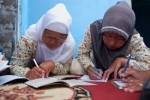 The main event for World Literacy Day are held in Dhaka, Bangladesh, where the 2014 international awards will go to projects from Ecuador, Burkina Faso, Algeria, South Africa and Spain.
The main event for World Literacy Day are held in Dhaka, Bangladesh, where the 2014 international awards will go to projects from Ecuador, Burkina Faso, Algeria, South Africa and Spain.
On occasion of the International Literacy Day, the United Nations Organization of Education, Science and Culture (UNESCO) issues a reminder of the huge challenges that remain in a world where there are still 781 million illiterate adults.
“I call on all states to step up their efforts, both political and financial, to fully recognize literacy campaigns as one of the most powerful means to accelerate sustainable development,” noted the general director of the organization, Irina Bokova.
A recent report published here by “Education for All” (EFA), recalled that of the total of illiterate adults, two third are women; while 175 million teenagers cannot read even a single phrase.
Even in high-income countries many young people are left behind, mainly minorities.
In France, for example, less than 60 percent of migrants reach minimum levels of reading comprehension, noted the document.
This year the UNESCO seeks to highlight the importance of education for girls and women, in achieving sustainable development.
“This is an opportunity to remember a simple truth: literacy changes lives and can even save it,” said the UNESCO General Director.
One of the conclusions of the EFA report is that if all women were to receive primary education, child mortality could be reduced by one-sixth and maternal mortality by two-thirds.
The main event for World Literacy Day will take place on Monday in Dhaka, Bangladesh, where the 2014 international awards will go to projects from Ecuador, Burkina Faso, Algeria, South Africa and Spain.
The UN body granted the King Sejong laurel to the Ecuadorian Education Ministry for its Basic Literacy Program for youth and adults, which has benefited more than 325,000 people since 2011.
The King Sejong prize was also conferred to the Association for the Promotion of Non-Formal Education in Burkina Faso, for its program “Training of Women in Situations of Extreme Poverty.”
Since its creation in 1997, this project has benefited 18,000 women, through education in five languages, including training in sustainable economic development. UNESCO also awarded three UNESCO-Confucio prizes to Algeria, South Africa and Spain.
 Escambray ENGLISH EDITION
Escambray ENGLISH EDITION





Escambray reserves the right to publish comments.